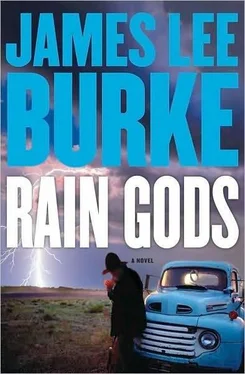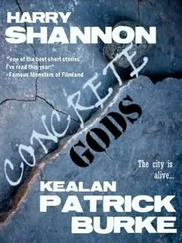Danny Boy’s answer was a long exhalation of breath, tiny bubbles of saliva coming to life at the corner of his mouth.
“Both of us have got the same problem, bub. We don’t belong in the era we live in,” Hackberry said. Then he felt shame at his grandiosity and self-anointment. What greater fool was there than one who believed himself the overlooked Gilgamesh of his times? He had not slept well during the night, and his dreams had taken him back once again to Camp Five in No Name Valley, where he had peered up through a sewer grate at the gargoyle-like presence of Sergeant Kwong and his shoulder-slung burp gun and quilted coat and earflapped cap, all of it backlit by a salmon-pink sunrise.
Hackberry retrieved a tick mattress from a supply closet and laid it out in front of Danny Boy’s cell and lay down on top of it, his knees drawn up before him to relieve the pressure on his spine, one arm across his eyes. He was amazed at how fast sleep took him.
It wasn’t a deep sleep, just one of total rest and detachment, perhaps due to his indifference toward the eccentric nature of his behavior. But his iconoclasm, if it could be called that, was based on a lesson he had learned in high school when he spent the summer at his uncle Sidney’s ranch southeast of San Antonio. The year was 1947, and a California-based union was trying to organize the local farmworkers. Out of spite, because he had been threatened by his neighbors, Uncle Sidney had hired a half-dozen union hands to hoe out his vegetable acreage. Somebody had burned a cross on his front lawn, even nailing strips of rubber car tires on the beams to give the flames extra heat and duration. But rather than disengage from his feud with homegrown terrorists, Uncle Sidney had told Hackberry and an alcoholic field picker named Billy Haskel, who had pitched for Waco before the war, to mount the top of the charred cross on the roof of the pickup and chain-boom the shaft to the truck bed. Then Uncle Sidney and Billy Haskel and Hackberry had driven all around the county, confronting every man Uncle Sidney thought might have had a hand in burning a cross on his lawn.
At the end of the day, Uncle Sidney had told Hackberry to dump the cross in a creek bed. But Hackberry had his own problems. He had been ostracized by his peers for dating a Mexican girl he picked tomatoes with in the fields. He asked his uncle if he could keep the cross on the truck for a few more days. That Saturday night he took his Mexican girlfriend to the same drive-in theater where he had already lost a bloody fistfight after the one occasion when he had tried to pretend the color line for Mexicans was any different than it was for black people.
As the twilight had gone out of the sky and the theater patrons had filtered to the concession stand in advance of the previews, Hackberry’s high school friends had assembled around the pickup, leaning against its surfaces, drinking canned beer, touching the boomer chain on the cross, touching the blackened shell-like wood of the cross itself, talking louder and louder, their numbers swelling as an excoriated symbol of rejection became a source of ennoblement to all those allowed to stand in its presence. That moment and its implications would stay with Hackberry the rest of his life.
Perhaps only fifteen minutes had passed before he opened his eyes and found himself looking squarely into Danny Boy Lorca’s face.
“Why were you waving your arms in the middle of the street?” Hackberry said.
“’Cause all my visions don’t mean anything. ’Cause everything around us is kindling waiting to burn. A drunk man can flip a match into the weeds on the roadside and set the world on fire. Them kind of thoughts always make me go out there flapping my arms in the wind.”
Danny Boy didn’t say where “there” was, and Hackberry didn’t ask. Instead, he said, “But you did your job. It’s on us if we don’t listen to guys like you.”
“Then how come I got this gift? Just to be a wino in a white man’s jail?”
“Think of it this way. Would you rather be sleeping overnight in my jailhouse or be one of those people who have no ears to hear?”
Danny Boy sat up, his thick hair like a helmet on his head, the bleariness in his eyes unrelieved. He looked at the ceiling and out into the corridor and at the clouds of yellow dust moving across the skylight. Then his head turned as he focused on Hackberry’s face. His eyes seemed to possess the frosted blue sightlessness of a man with severe cataracts. “You’re gonna find the man you been looking for.”
“A guy named Preacher?”
“No, it’s a Chinaman, or something like a Chinaman. The guy you always wanted to kill and wouldn’t admit it.”
“WE’VE GOT THE location of the phone number,” Pam said from the top of the steel stairs. “It’s a game farm up by the Glass Mountains.” Her gaze wandered over Hackberry’s face. “Have you been asleep?”
“I dozed off a little bit,” he said.
“You want to contact the sheriff in Pecos or Brewster?”
“See who’ll give us a cruiser at the airport.”
“We’re not sure Cistranos is at the game farm.”
“Somebody is there. Let’s find out who they are.”
“There’s something else. Maydeen got a call from a guy who wouldn’t identify himself. He wouldn’t talk to anyone but you. His number was blocked. She told him to hold on while she got a pad and wrote down his remarks. He hung up on her.”
“Who do you think it was?”
“He said you and he had unfinished business. He said you and he were the opposite sides of the same coin. He said you’d know what he meant.”
“Collins?”
“Know anybody else who makes phone calls like that?”
“Get the plane ready,” he said.
An hour later, they lifted off into bad weather, wind currents that shook the single engine’s wings and fuselage and quivered all the needles on the instrument panel. Later, down below, Hackberry could see the sharp crystalline peaks known as the Glass Mountains, the column-like mesas rising red and raw out of volcanic rubble or alluvial flood plain that had gone soft and pliant and undulating, as tan as farmland along the Nile, dotted with green brush, all of it besieged by a windstorm that could sand the paint off a water tower.
Then they were above a great wide fenced area where both domestic and exotic animals roamed among the mesquite and blackjack and cottonwoods, like a replication of a mideastern savannah created by an ecologically minded philanthropist.
“What’s your opinion on game farms?” Pam said.
“They’re great places for corporation executives, fraternity pissants, and people who like to kill things but can’t pull it off without their checkbooks.”
“You shock me every time,” she said.
NICK DOLAN HAD stopped thinking of time in terms of calendar units or even twenty-four-hour or twelve-hour periods. Nor did he think in terms of events or old resentments or jealousies or success in business. He no longer indulged in secret fantasies about revenge on his boyhood tormentors, Irish pricks like Artie Rooney in particular. As he watched his bank accounts and stock-and-bond portfolio seep away, and as the IRS focused its bombsights on his past tax returns, Nick remembered his father talking about life in America during the Great Depression, when the Dolinskis first arrived on a boat they had bribed their way onto in Hamburg.
Nick’s father had spoken with nostalgia of the era rather than of the privation and harshness the family experienced during the years they lived on the Lower East Side of New York and, later, by the Industrial Canal in New Orleans. When Nick complained about going to a school where bullies shoved him down on line or stole his lunch money, his father spoke with fondness of both the settlement houses in New York and the public schools in New Orleans, because they had been steam-heated and warm and had offered succor and education and opportu nity at a time when people were dying in Hitler’s concentration camps. Nick had always been envious of his father’s experience and emotions.
Читать дальше












